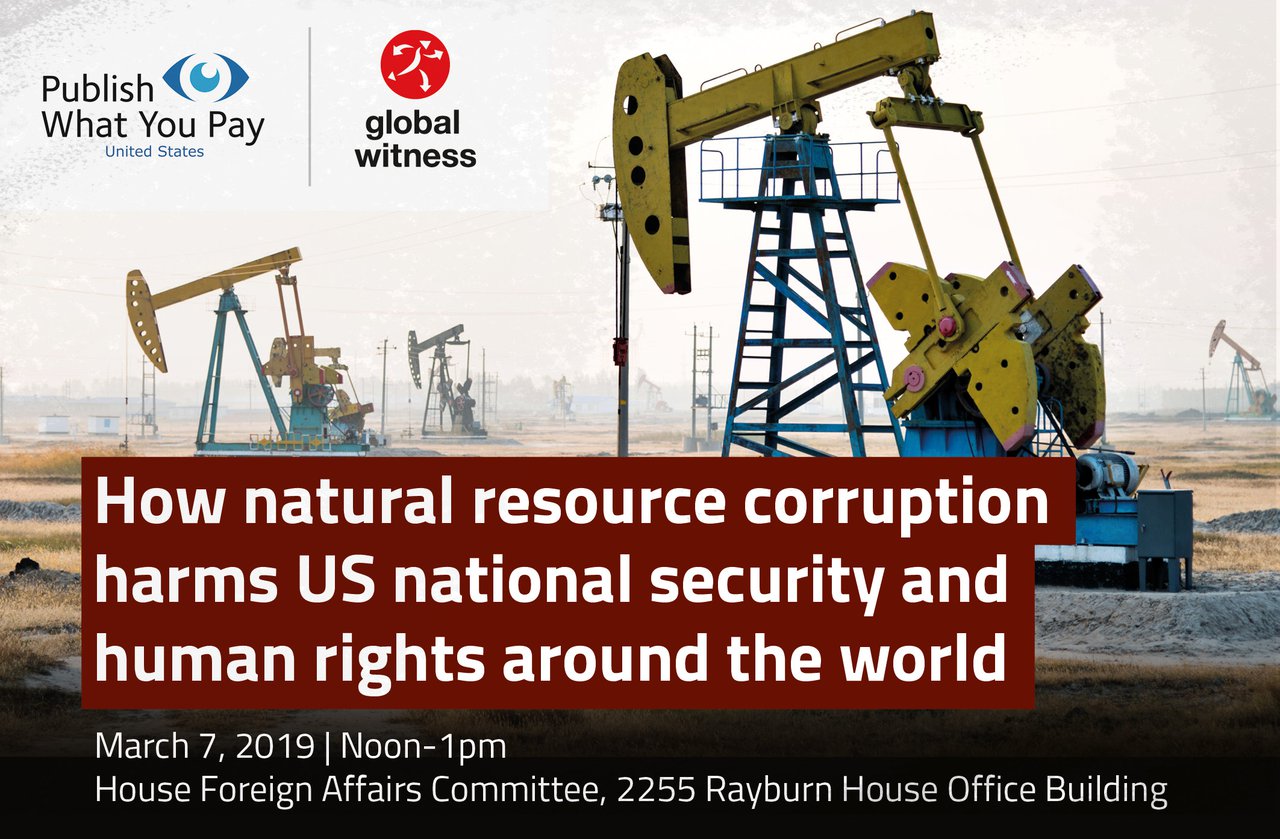
Publish What You Pay (PWYP) and Global Witness (GW) would like to invite you to attend a lunch briefing titled, “How Natural Resource Corruption Harms U.S. National Security & Human Rights Around the World.” The briefing will take place on Thursday, March 7th from noon to 1 p.m. in the House Foreign Affairs Committee, 2255 Rayburn House Office Building. Lunch will be served.
All too often, natural resource wealth in a country can provide funds to corrupt government leaders, terrorist organizations, insurgents, and ill-intentioned militias. Moreover, diversion of natural wealth proceeds can hollow out government resources needed to provide the stability necessary to promote development and investment. This is happening all over the world, from Venezuela, to Russia, to Nigeria, and beyond. PWYP and GW want to help ensure that elected officials, congressional staffs, and industry leaders understand more about the interlinkages between natural resource wealth, human rights abuses, and U.S. national security. Four experts will share solutions and U.S. policy recommendations that can help strengthen U.S. security by addressing this phenomenon.
Join us on Thursday, 3/7 for lunch (noon-1 p.m.) in House Foreign Affairs Committee, 2255 Rayburn House Office Building.
Click here to RSVP. We look forward to seeing you.
Speakers:
- Sarah Chayes’s trajectory led her from reporting for National Public Radio in Paris to running a soap factory in downtown Kandahar in the midst of a reigniting Afghan insurgency. Tapped to advise the topmost levels of the U.S. military, she served as special adviser to two commanders of international forces in Afghanistan and the chairman of the Joint Chiefs of Staff, before a five-year stint at the Carnegie Endowment for International Peace. Her work has uncovered the unrecognized reality that severe and structured corruption lies at the root of many international crises, from extremist violence to political uprisings that spin out of control. She is author of "Thieves of State: Why Corruption Threatens Global Security.”
- Debra LaPrevotte is the Senior Investigator for The Sentry, investigating greed that fuels war crimes and atrocities in Sudan, South Sudan Congo (DRC) and the Central African Republic (CAR). Prior to joining The Sentry, Debra retired after 20 years with the Federal Bureau of Investigation (FBI). Debra served as a Supervisory Special Agent on the International Corruption Unit at FBI Headquarters and was instrumental in initiating the FBI’s Kleptocracy program. Debra traced and seized more than $1 billion dollars from foreign corrupt officials. Debra has spent the past 23 years working international corruption investigations. Debra is also a Forensic Scientist and spent several years on the FBI’s Evidence Response Team Unit at the FBI Lab.
- Olarenwaju Suraju is a Nigerian anticorruption and environmental activist, chair of that country’s Civil Society Network Against Corruption, He also chairs the Human and Environmental Development Agenda (HEDA), a non-governmental organization that promotes transparency, accountability, inclusion and responsiveness in governance, in partnership with local, international and multilateral institutions. HEDA conducts research, policy advocacy, training, as well as citizens’ awareness and mobilization on core human development issues, including agriculture, food security, climate change, human rights, public sector accountability and electoral reform processes.
- Daniel Kaufmann is the president and CEO of the Natural Resource Governance Institute. He is currently a member of the Extractive Industries Transparency Initiative international board and serves in various international advisory boards, including the Organisation for Economic Cooperation and Development Secretary-General’s High-Level Advisory Group on Anticorruption and Integrity and the Inter-American Development Bank’s President High-Level Advisory Group on Transparency. He has also held several high-level positions at the World Bank. Kaufmann, a Chilean, received an M.A. and Ph.D. in economics at Harvard, and a B.A. in economics and statistics from the Hebrew University of Jerusalem.
Moderator:
- Corinna Gilfillan is Head of the US Office for Global Witness and for fifteen years has worked to combat corruption and improve governance in the natural resource sector globally. She played a leading role in securing the passage of a law to increase transparency in the oil, gas and mining sector and to help prevent minerals from financing conflict and human rights abuses. Corinna has testified before Congress and has served as a board member of the Extractive Industries Transparency Initiative (EITI). She previously worked for the United Nations Environment Program (UNEP) in Paris, promoting compliance with international environmental treaties in developing countries. She was also Director of Friends of the Earth U.S.’s Ozone Protection Program. Corinna holds an MSc in Environment and Development from the London School of Economics and Political Science and a B.A. from Duke University.
Closing:
Simon Taylor is co-founder of Global Witness and launched Global Witness’ oil and corruption campaign in 1999. In 2002, he co-founded the Publish What You Pay (PWYP) Campaign, which consists of more than 840 civil society organizations and 64 national coalitions, working to increase transparency and accountability in the extractives sector globally. The launch of PWYP led directly to the 2002 creation of the extractives industries transparency Initiative (EITI) by the UK Government. EITI is now an independent global multi-stakeholder initiative that places civil society in the central role of holding governments and companies to account for the revenue streams developed from extraction.